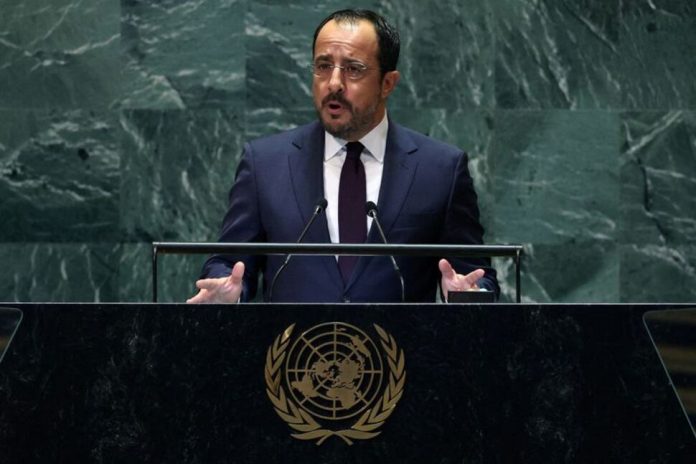President of the Republic of Cyprus Nikos Christodoulides told the 79th UN General Assembly in New York on Wednesday that he is determined to unite the island. A day earlier, Turkish President Recep Tayyip Erdoğan stated that there are two separate states and two separate peoples on the island, Euractiv reports.
Nikos Christodoulides told the UN General Assembly in New York:
“We cannot change geography. It is an opportunity, not a curse. Turkey and Cyprus will always remain neighbours. I adamantly believe we can carve a new path, one of peace, cooperation and collaboration.”
Cyprus was partitioned in 1974 by a Turkish invasion after a brief Greek-inspired coup, preceded by years of sporadic violence between Greek and Turkish Cypriots. Reunification talks collapsed in mid-2017 and have been stalled ever since.
The breakaway Turkish Cypriot state in northern Cyprus, backed only by Turkey, wants a two-state agreement that recognizes its sovereignty. Greek Cypriots say the only available framework is the one defined by UN resolutions calling for reunification under a bizonal, bi-communal federation. Christodoulides said:
“I am committed and I am ready to sit at the negotiating table today. Not tomorrow. Today.”
On Tuesday, Turkish President Recep Tayyip Erdoğan told the UN General Assembly that the federation model “is now completely invalid,” saying there are “two separate states and two separate peoples” on the island. He also said:
“The sovereign equality and equal international status of the Turkish Cypriots, which are their inherent rights, should be reaffirmed, and the isolation should now come to an end.”
He later told UN Secretary-General António Guterres that a meeting of the parties under UN auspices to discuss models other than federation could help, his office said.
Cyprus helps Palestinians
The problem of Cyprus, on the edge of the Middle East, is now largely overshadowed by the explosive situation in neighboring countries.
Earlier this year, the island became a bridge to deliver much-needed humanitarian aid to Israel-besieged Gaza in an initiative backed by the United Arab Emirates, the US and Israel. It has also offered to help evacuate civilians from the region if tensions escalate further.
Despite the grim outlook, however, Christodoulides said he would never accept a linear description of a region plagued by unrest. He also noted:
“I have experienced first-hand what countries in the region can achieve when they come together behind a common vision.”
